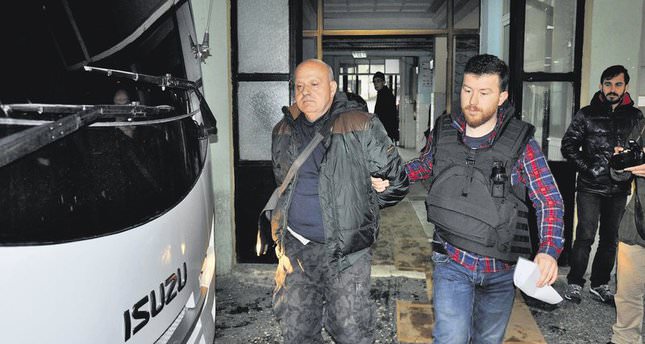Why can't Turkish government be honest about the past?
FORCED MARCH. Armenians being deported under armed guard, 1915. People were punished if they tried to help the victims.
RELATIONS between the Turkish government and Germany could be seriously strained by a row over a massive crime committed a century ago, when the two countries were military allies. This seems all the more ironic now, when Turkey and Germany are not only NATO allies again but Turkey needs German approval if it is to be accepted into the European Union (EU).
Despite reports that President Tayyip Erdogan was turning away from the long-stalled EU bid, the Turkish leader insisted in January that it was still under way, and said it would be Islamophobic of Europe to refuse Turkish entry.
http://www.todayszaman.com/anasayfa_erdogan-to-deem-eu-islamophobic-if-turkeys-bid-rejected_370724.html
Negotiations have been going on since 2005. In June 2013 it was reported that Germany, Austria and Holland were blocking the Turkish application because of the Turkish government's repression of protest demonstrations. And last month when a British journalist was arrested in a clampdown on an armed group in Turkey, Turkish papers claimed he was an agent of the German Federal Intelligence Service, BND.
But the latest row appears focussed on events a century ago, when Germany and the Ottoman Empire were allies in the First World War, the government in Istanbul dominated by German agents, and much of the Turkish armed forces came under German command.
Blaming Armenians allied to Russia for their reverses in the Caucasus, the Ottoman rulers began an organised onslaught on the Armenian minority. On 24 April 1915, they began by rounding up 250 Armenian intellectuals and community leaders in Istanbul for deportation. This was followed up by drafting Armenian army conscripts into forced labour units under brutally harsh conditions, massacres of Armenians in several places, and mass deportations of Armenian women, children and elderly people on forced marches into the Syrian desert.
Any Turkish soldiers or officers reluctant to commit atrocities, or civilians who tried to help those on the forced marches with food or water, could be punished.
Reports by neutral observers described what was happening. Some German officers and missionaries sent reports back to Berlin, as did engineers working on the Baghdad Railway, though the information was censored and suppressed by the Kaiser's government.
Estimates vary, but it seems around a million Armenians died in this Holocaust (a term first given its modern meaning with reference to the Armenian victims, some of whom were burned in pits).
The regime responsible for this slaughter has long gone. The main perpetrators met rough justice at the hands of Armenian avengers after the First World War. Yet to this day, while Armenians around the world commemorate the events, Turkish governments have refused to acknowledge what happened as genocide, and governments anxious to maintain good relations with Turkey have bowed to this insistence on denial.
Hence the significance of Germany stepping out of line:
German Parliament speaker: killings of Armenians genocide
By Associated Press
Published: 21:49, 24 April 2015 | Updated: 21:49, 24 April 2015
BERLIN (AP) — Germany's parliamentary speaker said Friday that the slaughter of Armenians by Ottoman Turks 100 years ago was genocide, and that Germany's own Nazi past makes it important to speak out.
"We Germans cannot lecture anyone about dealing with their past, but we can through our own experiences encourage others to confront their history, even when it hurts," Norbert Lammert told Parliament.
The comments came as Parliament began debate on a non-binding motion saying the Armenians' fate is "exemplary for the history of mass destruction, ethnic cleansing, expulsions and genocides by which the 20th century is marked."
It stresses Germany's awareness of the "uniqueness" of the Nazi Holocaust, to which Lammert also alluded.
"What happed under the Ottoman Empire ... was a genocide," he said. "It did not remain the last in the 20th century."
Parliament was expected to vote to approve the motion before its summer break.
Historians estimate that up to 1.5 million Armenians were killed by Ottoman Turks around the time of World War I, but Turkey denies the deaths constituted genocide, saying the toll has been inflated, and that those killed were victims of civil war and unrest.
The German government hasn't used the term genocide, but had faced increasing pressure to do so.
On Thursday, German President Joachim Gauck labeled the killings genocide in a speech to a memorial service in Berlin.
Turkey's Foreign Ministry said in a statement late Friday that Gauck doesn't have "the right to attribute on the Turkish people a crime which they have not committed."
It said that the "Turkish nation will not forget and forgive President Gauck's statements." Germany has a large Turkish minority.
In his speech, Gauck also noted that Germany, Ottoman Turkey's ally a century ago, must consider what responsibility it shares for the killings.
German soldiers were involved in planning and carrying out deportations, he said, adding that "tips from German observers and diplomats who recognized the will to destroy in the action against the Armenians were ignored."
http://www.dailymail.co.uk/wires/ap/article-3053889/German-Parliament-speaker-killings-Armenians-genocide.html#ixzz3ZtZYqcWm
I've added emphasis to those two last pars. The German president deserves credit for this admission of complicity in what happened.
And the Turkish Foreign Ministry deserves condemnation, not only for denial, but for pretending that it is "the Turkish people" to whom blame is being attributed. We have met this dirty tactic before, and elsewhere, of political leaders trying to drag an entire people to their side when rejecting accusations.
But what is peculiar about this example is that the Turkish government is, for whatever reasons, still defending a long departed regime over a century old crime. In doing so it insults the Armenian people, and takes a share of the crime upon itself.
Further reading: http://www.jewishsocialist.org.uk/features/item/armenian-holocaust



 AA Photo
AA Photo SAKINE CANSAZ
SAKINE CANSAZ



